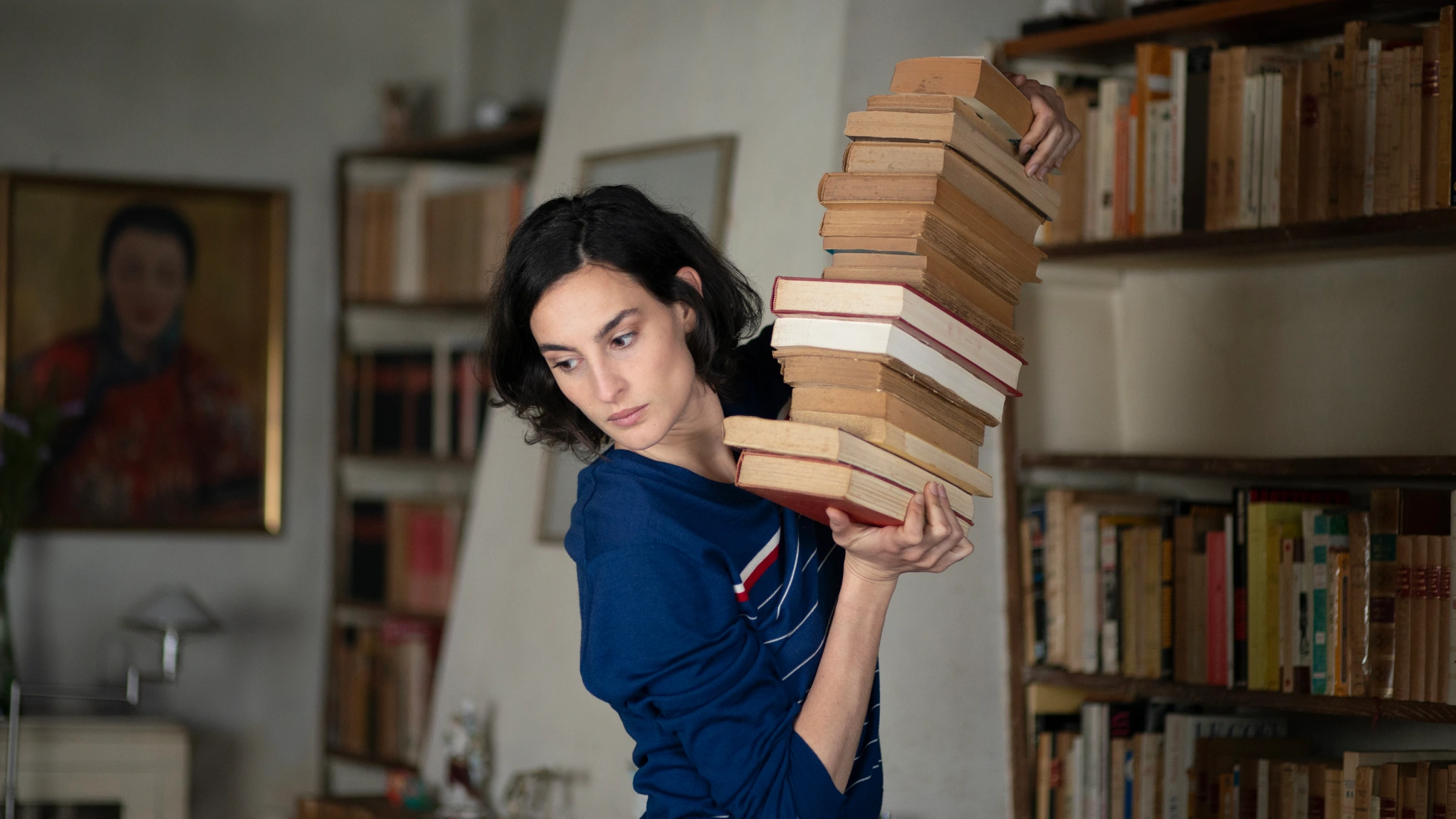Hors du temps – Assayas Island or Summer (E)state of Cinema | Berlinale 2024
Let’s exorcise the big, vexing flaw at the outset: the obvious privileged perspective. Olivier Assayas’s pandemic, autobiographical tale is a luxury few of us could afford: some “rich intellectual kids” are forced to spend their lockdown in a gorgeous old house surrounded by the most picturesque landscapes of Normandy (poor them). Of course, there is a lot of (self-)irony in how the small and silly concerns of these four characters, who are more worried about socks and buying pots than the trauma engulfing the entire globe, reach the audience. Still, the film risks falling into a blatant insensitivity, after concluding with the idea that the pandemic also came as a moment of respite.
Now, let’s address my flaw: I’ve spent a lot of time in recent years with Olivier Assayas’s films and writings, especially translating his text for Sabzian on the state of cinema today, so I have no chance of being objective. Regardless of how this film may bother and irritate or disappoint with its self-indulgence, I stand by it. In fact, I found the film extraordinarily delightful because I could recognize in it all of Assayas’s recent concerns about cinema and image. As I see it, Hors du temps perfectly complements his essay in Sabzian (which is also marked by the pandemic context) as it employs the same blend of exaggerated autobiographical elements, cinephilia, and film theory. There even seems to be a cheeky allusion to this whole endeavor in the film – see the scene where Paul (Vincent Macaigne), a film director, and Assayas’ alter ego, makes some statements on Zoom about the fate of cinema while also wearing a striped shirt.

Hors du temps is too, like Assayas’s films in general, a lecture about cinema, but here the metacinematic and autobiographical tendency is no longer just a hidden strategy; it is articulated, for the first time in his fiction oeuvre, in the first person. The previous effort, Irma Vep (the series, 2022), where René Vidal (also Macaigne) clearly plays Assayas, and which made various transparent references to the director’s personal history with Maggie Cheung, is pushed further in Hors du temps: Assayas himself intervenes in the narrative thread, through voice over, to introduce the house (which is his actual childhood home) and its surroundings to the audience.
These numerous digressions – vignettes, musings on cinema, childhood stories, cinephile references, praises and references to painters, confessions about his own family – are what make Assayas’s new film worthwhile, and less so the narrative about an uninspired and somewhat neurotic film director (admittedly more at peace with himself than Vidal), who clashes and quarrels with his brother, a music journalist, over knowledge of art. Aside from the obvious essay-cinema tone, the film comes with a strange thrill of disarming vulnerability – there is something deeply moving about this direct speech, as if the curtain has fallen and the Wizard of Oz has finally shown himself to humanity.
Just as Paul, apparently quoting from David Hockney (the hilarious obsession of both the director in the film and Assayas himself), confesses that he is struggling to write fiction, so Hors du temps is less a fiction film and more a chronicle – of cinema and his own life. Three major ghosts haunt this splendid Normand setting: the brightness of nature surrounding the house interweaves the direct quote from Hockney’s album The Arrival of Spring, Normandy, 2020 with Conte de printemps (1990) and other attributes of the Rohmerian countryside, but also with a specter of Partie de campagne (1946, Jean Renoir). Of them all, it’s Renoir’s name that seems to be the key to this chronicle by Assayas, who here stages his own Ma vie et mes films and Pierre-Auguste Renoir, mon père, examining his upbringing, childhood, and, in particular, the influence his father exerted on him: Renoir-Renoir and Assayas-Assayas (Rémy). That vulnerability – of the filmmaker, the writer, the cinephile, and the child, which this familiar space makes him revisit – emanates from here.
Also in a Renoirian spirit (this time the father), apart from exploring that character-surroundings relationship so definitory for Rohmer, Hors du temps might be seen as a landscape film, perhaps to an even greater extent than Clouds of Sils Maria (2014). Assayas ponders greatly – and explicitly – on a cinema that has lost its connection with nature, a connection he seems to be trying to recover here, both himself and his characters. Why shouldn’t the ephemeral beauty of Monet’s landscapes have a place in cinema? wonders Assayas. I remember vividly this reference by the director, and here’s my theory to the theory: ontologically speaking, I have always believed that if the Impressionists had been born a few decades later, they would all have been filmmakers.
Leaving aside these newer, more candid directions of Assayas, which seem heavily influenced by the Hocknenian-pandemic need to relate therapeutically to nature, Hors du temps is not that different from his other recent films. The classic fare: lots of industry and art jokes, interspersed with easy-to-spot autobiographical references like Paul’s wife, who’s also a director, or savory tidbits like a project proposal in which Kristen Stewart is supposed to play a Portuguese nun. As expected, Hors du temps is an expert cluster of cinephile references and names of artists, big and small, from both universal and local culture, sometimes in jest, sometimes with deep reverence – from Bob Dylan, Tarantino, Bonnard, Abelard and Heloise to Kenneth Anger and Laurent Perrin –, the dead ones always seem to be the best. Returning to the cinema-essay qualities of the film and the fragmentation caused by the director’s entries, his Berlinale proposal makes me see Assayas as going through an interesting period resembling Radu Jude or, at least, Hors du temps seems to highlight more than ever the similarities between the two.

And, in the end, what about cinema? The film focuses less on the fate of cinema as a whole and more on Paul’s neuroses, who is tormented not just by the pandemic, germs, and a burnt pot that he scrubs comically and obsessively, but also by his own limitations and lack of inspiration. He has never felt less like a filmmaker, he says – the pandemic seems to have given him this unexpected opportunity to take a break from filmmaking. Okay, now let’s talk about cinema in general – which no, is not dying. As Paul states on Zoom, the industry is by no means in ruins but is in danger of becoming rigid and “moins libre” (less free).
Hors du temps is what I call an inner-circle film; Assayas fans will love it, while others will be annoyed either by its concentricity or a certain naivety (see unexpected honesty). It will equally be rejected by those tired of pandemic films, even though it’s worth saying that it presents it in such a superficial manner that it seems as if it never existed, aside from some comic situations – a privileged perspective, yet different from how we’ve come to understand this collective trauma we’ve been through.
Title
Hors du Temps / Suspended Time
Director/ Screenwriter
Olivier Assayas
Actors
Vincent Macaigne, Micha Lescot, Nine D’Urso, Nora Hamzawi, Maud Wyler
Country
Franța
Year
2024

Graduated with a BA in film directing and a MA in film studies from UNATC; she's also studied history of art. Also collaborates with the Acoperisul de Sticla film magazine and is a former coordinator of FILM MENU. She's dedicated herself to '60-'70s Japanese cinema and Irish post-punk music bands. Still keeps a picture of Leslie Cheung in her wallet.


